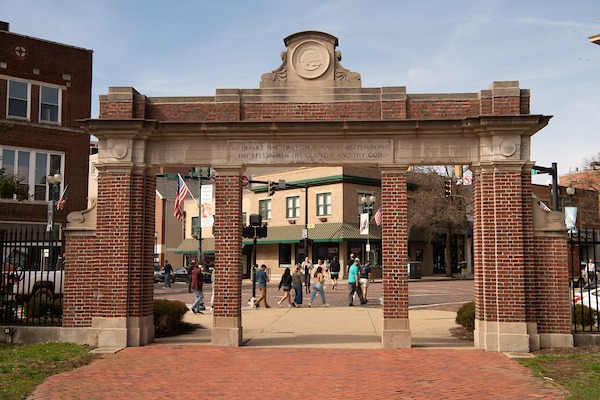Graduate Degree

What is a graduate degree?
A graduate degree is a type of advanced academic credential. Graduate degrees are typically earned by completing a thesis or research project, and they often require students to take classes in their field of study.
Most graduate programs offer master’s degrees and doctorates, but some schools only offer one or the other. The most common fields for these advanced degrees include business administration, education, engineering, law (Juris Doctorate), medicine (Medical Doctorate), science — including biology, chemistry and physics — and urban planning or architecture.
Why pursue an MS or MBA at Ohio State?
Ohio State is a public research university with a large and diverse student body. The school has a strong reputation for research and innovation, making it an ideal place for graduate students pursuing advanced degrees in their field. In addition to its undergraduate programs, Ohio State offers more than 100 graduate degree programs across seven schools: the College of Arts and Sciences; Fisher College of Business; School of Dentistry; College of Engineering; School of Optometry & Vision Science; Moritz College of Law; School of Medicine (Health Sciences Center); School of Nursing at Marion Campus/Medical Center at Dayton site.
The University ranks highly among public universities according to U.S News & World Report’s annual Best Graduate Schools rankings: it ranks #1 among top publics in education policy studies (#2 overall), criminology (#7 overall), physics (#9 overall), psychology (#14 overall) and sociology (#17 overall).

Which program should I choose?

There are several options if you’re interested in pursuing a graduate degree. The MSFS and MSDST programs both require coursework related to food science or dairy science with an emphasis on the applications of these sciences in the industry. The MBA program offers concentrations in Food Industry Management and Food Marketing, which will prepare you for careers as an executive or manager within your field of study.
The curriculum for all three programs includes courses like “Principles of Food Science,” “Food Biotechnology,” and “Regulatory Issues Related to Animal Health Products.” However, each program also has its unique requirements (you can see them here).
To help you make an informed decision about which program best suits your needs and interests, we’ve outlined some key differences below:
How long does it take to earn a graduate degree?
The time it takes to earn a graduate degree depends on the program. The average time to complete an MS is 1-2 years, and the average time for an MBA is 2-3 years. For example, most students who start their doctoral studies in the fall semester will complete their degrees in three years (five semesters). If you are considering taking classes part-time or online, be aware that these options may extend your education beyond four years.
The same applies if you decide not to pursue your first choice program but instead opt for another option within the same school–you could spend more than four years earning your degree!
What are the long-term benefits of receiving an advanced degree?
An advanced degree can help you stand out in the job market and increase your earning potential. The more education you have, your career prospects are when looking for work. Many employers prefer to hire candidates with master’s degrees or PhDs because they know they are more likely to be qualified for positions than those who only hold bachelor’s degrees.
In addition to helping you get ahead at work, an advanced degree can also improve your chances of promotion within an organization–and this is especially true if your company has an internal advancement program that rewards employees based on merit rather than seniority alone. Finally, receiving additional education provides flexibility in terms of where and how long it takes before returning home each day after work; this may allow some parents who previously felt unable due to time constraints (such as working multiple jobs) to find ways around those obstacles so they don’t miss out on important family events such as birthdays or weddings!

The College is ranked #1 by U.S. News & World Report among all U.S. public university programs in its three departments, including Dairy Science, Food Science, and Animal Science
The College is ranked #1 by U.S. News & World Report among all U.S. public university programs in its three departments, including Dairy Science, Food Science, and Animal Science.
The College was founded in 1873 as the Department of Agriculture and Mechanic Arts (A&MA). It was one of the first four schools established at Ohio State University under its original name as a land-grant college under the Morrill Act of 1862. In 1913, A&MA was renamed Agricultural Engineering; however, this only lasted until 1926, when it became known as Agricultural Engineering and Dairy Husbandry (AEHD). In 1939, AEHD became just Agricultural Engineering; however, this only lasted until 1944, when it became known as Agricultural Engineering again until 1948 when it was renamed to what we know today: Agricultural Sciences & Veterinary Medicine (ASVM).
Students focus on the science behind food production and apply their knowledge to real-world problems related to food safety and quality, nutrition and health, animal welfare, and food sustainability
Graduates of the Doctor of Philosophy in Food, Science degree program are prepared to solve problems in the food industry. The program provides students with a strong foundation in scientific research methods and theory; students then apply their knowledge to real-world issues related to food safety and quality, nutrition and health, animal welfare, or sustainable agriculture.
Students focus on the science behind food production and apply their knowledge to real-world problems related to food safety and quality, nutrition and health, animal welfare, or sustainable agriculture. They also develop an understanding of how various factors affect each of these areas: economics, politics, law, psychology, sociology – especially as they relate specifically (but not exclusively) within today’s globalized market economy we live within today.”
